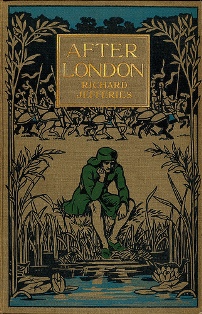
First published back in 1885, Richard Jefferies’ novel ‘After London; or, Wild England’ was one of his last publications to be released before his sad death in 1887. The tale is generally regarded as the second full-length novel to see publication that deals with a post-apocalyptic premise (the first being Mary Shelley’s novel ‘The Last Man’ (1826)). Largely because of the early date of this ground-breaking premise, the novel has become an often referenced publication within this popular and possibly now over-saturated subgenre.
DLS Synopsis:
The world as it stands now is a world post-catastrophe which has dramatically reduced civilisation both in numbers and in sociological practices. Civilisation has now been tossed back to almost a medieval standing; with tribes and barbarism forming the new society of the United Kingdom (and no doubt beyond).
Nature has once again reclaimed the vast majority of the landscape; cities and towns reduced to just vague memories glimpsed through the remaining piles of rubble. Relics from the past are highly treasured artefacts, held by those born into an elevated position within the new social hierarchy. Literary skills are also now merely for the higher ranking of society.
Felix Aquila plans to prove his worth to claim the love of the woman he idolises – Aurora. After spending a huge amount of time and effort building a solid oak canoe, Felix decides to embark on a voyage of exploration around the circumference of the vast inland lake that now dominates the majority of the centre of England.
Leaving behind his brothers, his social standing and his moderate wealth, Felix takes his hand-carved canoe across these great waters, on a quest for further knowledge and with it, social credibility. On his travels Felix will encounter hostile tribes, gaseous marsh land, factions at war and what is possibly the after-effect of a great volcanic eruption in the midst of the British landscape...
DLS Review:
The first section of Jefferies’ novel (‘Wild England’) is a fascinating display of imagination, as the author paints a detailed and thought provoking picture of a new landscape dictated by the after effects of a great unspecified catastrophe. The return to nature for the land and the relapse into barbarism for the remaining civilisation is a powerful image to begin the book with. Once Jefferies has finished his intrinsic study of this new world, the second (and larger) portion of the novel begins – that of the story of Felix and his voyage of discovery.
From the outset, the character of Felix is portrayed in a likeable fashion. He is a thinker rather than a doer. Verging towards becoming a social outcast, and wanting to gain the love of Aurora; Felix’s mission is more a coming of age story than a true adventure. However, each one of his abilities is put to the test during his voyage, resulting in a dramatic character reforming of Felix.
So many inspirational elements are thrust into the construction of this fast paced and entertaining tale. With the noxious fumes emitted from the vast swamps that were once London, this would later form the possible inspiration for the likes of M P Shiel’s ‘The Purple Cloud’ (1901) or indeed much later on with James Herbert’s classic splatterpunk novel ‘The Fog’ (1975).
The final section of the novel draws a more positive parallel towards that of Joseph Conrad’s ‘Heart of Darkness’ novella (1899). However, the monumental inspirational impact that the novel had on the post-apocalyptic subgenre as a whole is where the real importance of the book really rests; paving the way for countless novels that explore the landscape and social aspects of a haunting new world.
The vast majority of the story is gripping and exciting, with many small subplots and substories slotting together to form a fast paced and eventful tale. However, pre-voyage, the storyline does take a while to get going, with some very staggered and laborious chapters setting down the premise for the adventure and predominately Felix’s undying love for Aurora. However, once this is done, Jefferies’ sets sail for a storyline packed with adventure and personal discovery.
From here on in the novel is as gripping as it is thrilling, until it draws to the eventual and somewhat untimely ending. Although a lot of ground has indeed been made for Felix (no more so than for his very strength of personality) the ending is still somewhat abrupt, seemingly to jump out of nowhere without finding a satisfying cut-off point. This however does not overshadow the final chapters of the novel too much, but does leave the reader feeling somewhat disjointed and left-afloat.
All in all, the novel is an important early steppingstone for post-apocalyptic fiction, and a very enjoyable and satisfying read. Characterisation is superb, as are Jefferies’ depictions of his new and haunting world.
The novel runs for a total of 152 pages.
© DLS Reviews






